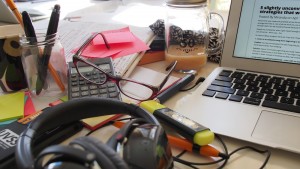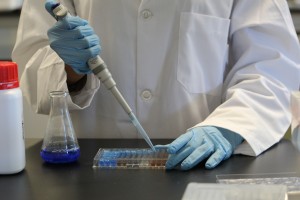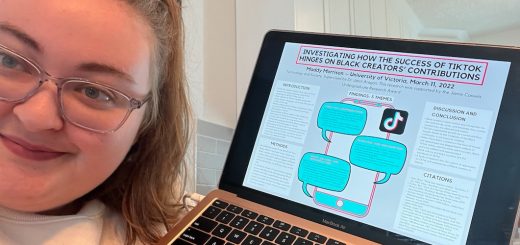Advice for Incoming Science Students From a UVic Science Graduate
In June, I received my B.Sc. from UVic in microbiology. It felt surreal and I couldn’t believe how fast time had gone by. I can remember sitting in my first lecture at UVic in September of 2011, and now I was moving on to another adventure.
For this blog post, I thought I would write out a list of tips that I wish someone had given me when I was starting out in UVic’s science program. Some of these tips will be rehashed from a previous blog post I did, along with several new tips. Let’s get started!
Things I Wish Someone Had Told Me In First-Year Sciences
 1. There’s no homework in university. You’re given a list of suggested practice problems at the beginning of the term and it’s up to you whether you complete them or not. Hint: DO THEM.
1. There’s no homework in university. You’re given a list of suggested practice problems at the beginning of the term and it’s up to you whether you complete them or not. Hint: DO THEM.
2. You don’t have to go to class! Professors do not take attendance and couldn’t care less whether you attend or not. Overall, I recommend going to class. If your class requires an iClicker, I strongly recommend going to class.
3. It’s much easier to get As in high school than in university. Be prepared to work hard. In first year sciences, one class will often carry the same workload as about three high school classes; however, don’t be scared. They are very manageable as long as you manage your time well.
4. You simply don’t have the time to review every single subject in depth every day. Typically, I would study three subjects in depth (say, chemistry, physics and biology for an hour each, for example) every day. For the other two subjects, I would not study one of them and for the last subject, I would do a quick 10-minute review of a study sheet for the class that I had made the night before while studying that topic in depth.
5. Go to every class (even though you’re technically not required to do so). You will be able to catch anything that the professor emphasizes as important and you will be able to have your questions answered.
 6. For first year sciences, I put in 2-3 hours of studying per night (not including time spent studying during the day) during the regular school week and approximately 8 hours per day for finals.
6. For first year sciences, I put in 2-3 hours of studying per night (not including time spent studying during the day) during the regular school week and approximately 8 hours per day for finals.
7. Set aside time for yourself. You don’t want to work so hard that you burn out.
8. Don’t set aside too much time for yourself. An appropriate amount is 1-2 hours per day. Take an hour to sit back and have dinner and relax and then a minimum of 15 minutes to unwind before you go to bed. Every night, I would watch an episode of a funny TV show before going to bed to help me unwind and clear my thoughts.
9. Go see professors in their office hours as often as possible. They’re there to help clarify any material that you find confusing.
10. Start studying for a midterm at least 3 days before it takes place.
11. Start studying for a final at least 10 days before it takes place.
12. Do every assigned practice problem twice.
13. See #12.
 14. Form study groups with students in your classes! You will find yourself enjoying studying more if you study with others. Group studying is particularly helpful with biology.
14. Form study groups with students in your classes! You will find yourself enjoying studying more if you study with others. Group studying is particularly helpful with biology.
15. Worst place to study: 2nd floor of the McPherson Library. It’s too loud to even work in groups.
16.Best place to study on campus: Law Library. It’s quiet, big and has plenty of free space. No group studying is allowed there though.
17. Best place for group studying: study rooms in McPherson Library.
18. Buy practice exams from ZAP Copy Centre during exam season. Immensely helpful for studying for final exams.
19. Labs will be challenging. Ask questions. Go see your lab instructor for help and put as much effort into your lab write-ups as possible (I’d say an appropriate length is about 4-5 hours).
 20. Most professors are supplying students with their own notes now, so you won’t be using the textbook as much as you think. Nonetheless, BUY THE TEXTBOOK. It will save you the massive headache that comes with having to find explanations on the internet.
20. Most professors are supplying students with their own notes now, so you won’t be using the textbook as much as you think. Nonetheless, BUY THE TEXTBOOK. It will save you the massive headache that comes with having to find explanations on the internet.
21. Take advantage of the McPherson Library’s textbook rental section. It saves you having to carry heavy textbooks around all day.
22. If you’re in residence, it’s normal to feel homesick. Best therapy: stuffed animal from home.
23. Best electives: BIOC 102, EOS 170, MUS 308, ASTR 201.
24. Don’t feel that you need to have a game plan on the first day. Loads of people will change their career pathways as their degree presses on. Instead of focusing on the future, you should focus on getting good grades now and cross your bridges when they come to you.
25. If you like the life sciences and prefer lab work over classroom learning, you’re probably suited for the biochemistry/microbiology program.
26. If you like the life sciences but prefer classroom learning over lab work, you’re probably suited for the biology program.
27. If you’re big on chemistry and biology, then the ChemMedSci program is probably your best option.
28. Attend research seminars like the UVic HonoursFest in February. You’d be amazed to see the work that UVic students have the opportunity to do, and it helps to make acquaintances with professors.
29. You’ll come across competitive students. Don’t let that get to you. You need to focus on doing your very best and not on beating someone else.
 30. Get involved. UVic has a club that can cater to anyone’s preferences. Throughout my undergrad, I was a regular member of four clubs and dabbed into four others.
30. Get involved. UVic has a club that can cater to anyone’s preferences. Throughout my undergrad, I was a regular member of four clubs and dabbed into four others.
31. Socialize. Believe me. In my first year, I spent most of my days in the library and didn’t meet a lot of people in my classes. Starting in second year, I made an effort to meet as many people as I could and I started enjoying UVic exponentially more.
32. There are countless options you’ll find during and after your undergrad. These opportunities will not always find their way to you, though. You often will have to seek them out yourself.
33. It’s okay for your path to change during university. I began first year thinking that I was going to be a biology teacher, but ended up becoming interest in drug development instead.
34. Take an array of electives. A university is a place of intellectual diversity, and getting a perspective on topics you’re not used to can be pretty cool. As a microbiology major, I took a course on the history of rock and roll and it was a blast. I wish that I had taken courses on economics and political science.
35. Bring a regular book with you. I’m a huge fan of true crime/forensics novels, so I would carry one in my backpack if I needed to take a mental break from studying.
36. The Freshman 15 is a real thing. Trust me, I know. Be conscious of your diet in university. It’s easy to fall into the trap of eating unhealthy during the stress of academics, and it can be a hard habit to break.
37. Bring some earplugs with you when in the library. You’d be amazed at how much your focus increases when using them.
38. UVic has a DeStressFest in March. Check it out! It’s got puppies, among other things to help cope with the stress of exams.
 39. Three words for doing well in first year biology: flashcards, flashcards, and flashcards.
39. Three words for doing well in first year biology: flashcards, flashcards, and flashcards.
40. You’ll likely be surprised by the complexity of the material you’re learning. Don’t let this overwhelm you.
41. Have an easy go-to activity that works for you for de-stressing. Mine was the guitar.
42. Be a good and courteous lab partner. You’d be amazed at how much faster you work when you’ve got a good partner. I still keep in touch with my CHEM 101 lab partner, four years later!
43. Favorite food on campus: Mac’s.
44. University isn’t as wild as the media portrays it to be. Sure, you’ll have parties, but most students in university are there to work, not to party. This is reality, not Blue Mountain State.
45. Bad marks will happen, it’s inevitable. Don’t let them get you down. Instead, let them motivate you to do well on the remaining assignments/tests/courses.
46. Chat with your Orientation leader as much as you can. They are there to help you and can provide more advice than you’d expect.
47. Be yourself (sounds cliche, I know), but you’d be amazed at how many like-minded people there are at university. Be yourself and you’ll meet them eventually.
48. Yes, university is tough. Yes, it can get overwhelming. Yes, it can be conquered with hard work.
49. Help your classmates: it helps you make friends and makes a huge difference in your university experience.
50. The next four years are yours to work with, and you’ll get what you put in to it.



